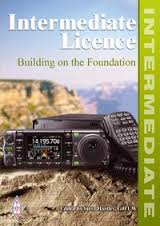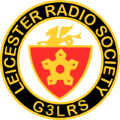Once you have successfully completed the Foundation exam, you can choose to progress to the Intermediate license. This license carries with it more privileges and also more responsibilities on you as a radio amateur. The course is longer and more challenging than the Foundation, we would usually aim to complete Intermediate courses within 12 weeks. There are a number of practical assessments, these are necessary as one additional privilege afforded to Intermediate license holders is the ability to operate radio transmitters that they have built themselves, so an understanding of construction techniques and safety together with knowledge of how to setup transmitters is needed.
The course is longer and more challenging than the Foundation, we would usually aim to complete Intermediate courses within 12 weeks. There are a number of practical assessments, these are necessary as one additional privilege afforded to Intermediate license holders is the ability to operate radio transmitters that they have built themselves, so an understanding of construction techniques and safety together with knowledge of how to setup transmitters is needed.
We recommend that all candidates purchase the RSGB book titled 'Intermediate License, building on the Foundation' as that will allow you to do additional study outside of the classroom.
Once you have successfully completed the Intermediate exam and assessments, you will be able to apply to OFCOM for your Intermediate callsign. This will be issued in addition to your 'M6' Foundation callsign and will take the form of 2E0XXX
If you are ready to progress to the Intermediate level, please contact our Training Team for more information
We operate the Intermediate course in accordance with the latest RCF syllabus (October 2015)
Once complete, candidates will demonstrate their ability to:
- Know the various amateur licenses and callsigns including Regional Secondary Locators and optional suffixes.
- Know the types of operation and messages that they are/are not allowed to send, how often they need to identify their station. The meaning of different types of location and where they are allowed to operate. What types of unattended operation are allowed, when a log is required to be kept, actions to be taken when interference is suspected and how often their license must be confirmed.
- Know the various units of measurement and simple circuit theory, they should also be able to identify various different electronic components and what function they perform, together with an ability to take voltage/current/resistance measurements with a multimeter.
- Identifiy components of transmitters/receivers for CW, AM, FM and SSB using block diagrams. Also know the function of RF oscillators, mixers, intermediate frequency (IF), detectors and AGC together with a knowledge of modulation and sidebands. In addition they will know techniques for minimizing transmitter interference.
- Knowledge of feeder types and characteristic impedence. Antenna impedance, standing waves, antenna tuning units and aspects of antennas and how to use a dummy load.
- Understanding of radio propogation including the troposphere and ionosphere layers and how they each effect radio transmission. Also how weather can effect signals and how to calculate frequency or wavelength.
- Basics of electromagnetic compatibility, radio housekeeping, sources of interference and simple remedies together with the social issues of interference and your responsibilities.
- Operating practices including Q codes, abbreviations, RST code and relative advantages of different operating modes. Different types of modulation, good operating practices and operating amateur satellites.
- How to solder and use hand tools in a safe manner, in addition they will know how to safely work at heights and operate electrical and RF equipment safely.
- Basic construction techniques, how to recognise components, how to solder and recognise resistor colour codes. This includes various practical assessments including building and testing a simple circuit, fitting a PL-259 connector, wiring a 13A plug and calibrating a simple VFO. You will also need to construct a simple project.
The course will be operated at a pace which is comfortable for the candidates and prior to the examination, each candidate will have the opportunity to suggest items that they are uncomfortable with for further discussion.
Everything will be provided to complete practical assessments but you must purchase your own 'project' kit. Various suitable kits are available online and from retailers like Maplin. This is simply to demonstrate an ability to solder and identify components. The training team will be able to make suggestions regarding suitable projects.






